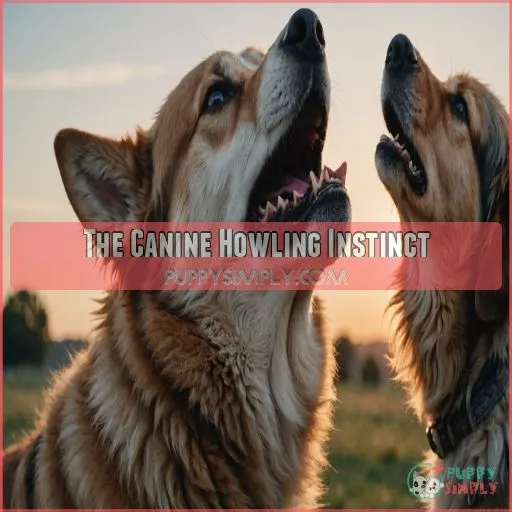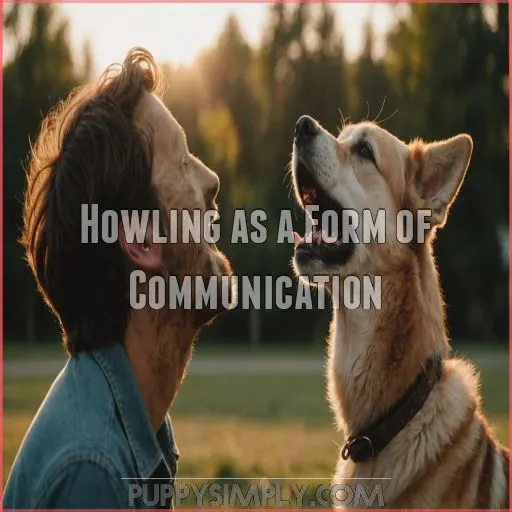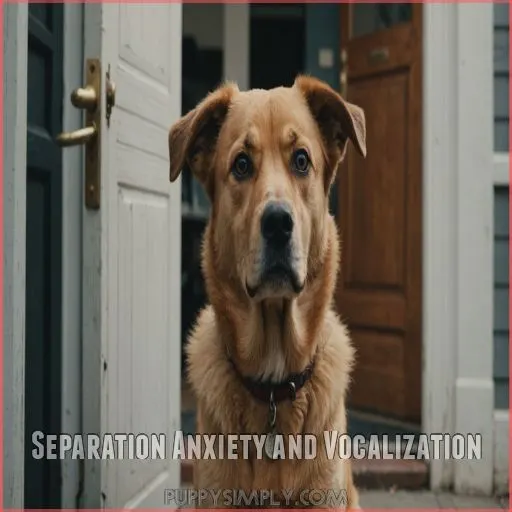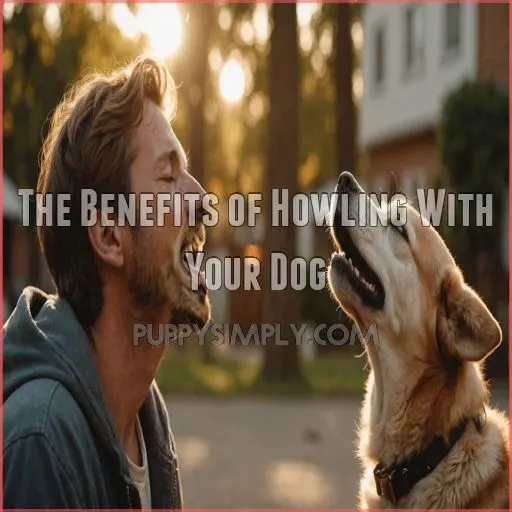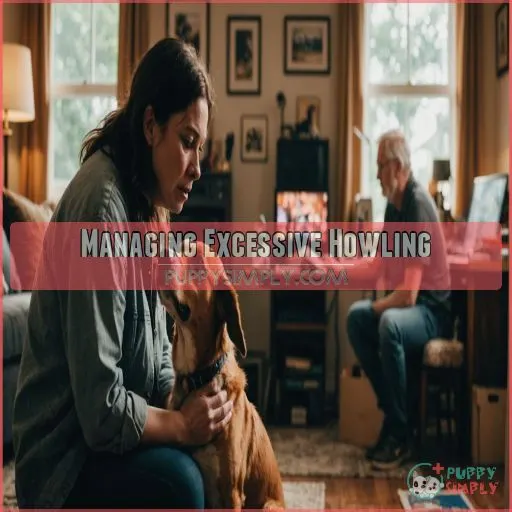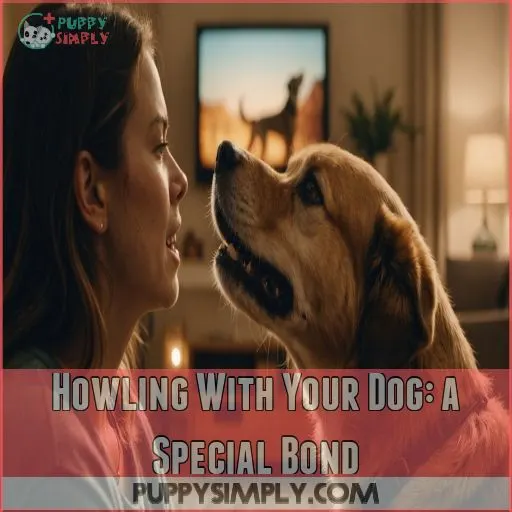This site is supported by our readers. We may earn a commission, at no cost to you, if you purchase through links.
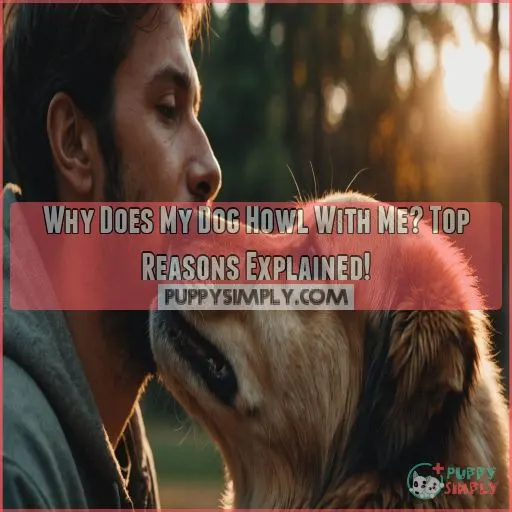 If you’re wondering, “Why does my dog howl with me?” you’re in for a treat! Your dog howls with you because it’s rooted in their wolfy ancestry. It’s a sweet serenade—like a duet!
If you’re wondering, “Why does my dog howl with me?” you’re in for a treat! Your dog howls with you because it’s rooted in their wolfy ancestry. It’s a sweet serenade—like a duet!
They’re social creatures, and howling strengthens the bond between you, sparking a sense of belonging. They might be mimicking you, thinking of it as fun or trying to grab your attention in a playful way.
Just like us singing along to our favorite tunes, your dog’s howl is their way of connecting and engaging with you. And who knows, maybe you’re hitting all their favorite notes! Curious about howling at sirens too? Stay tuned!
Table Of Contents
- Key Takeaways
- The Canine Howling Instinct
- The Science of Howling
- Howling as a Form of Communication
- Separation Anxiety and Vocalization
- The Benefits of Howling With Your Dog
- Managing Excessive Howling
- Why Howling is Good for Dogs
- Howling With Your Dog: a Special Bond
- Frequently Asked Questions (FAQs)
- What does it mean when you howl with your dog?
- Is it good for a dog to howl?
- Do dogs howl when happy?
- Why does my dog stare at me and howl?
- Is dog howling a sign of distress?
- Can howling be trained as a behavior?
- Why do some dog breeds howl less?
- Does age affect a dogs howling frequency?
- How can diet influence a dogs vocal behavior?
- Conclusion
Key Takeaways
- When you howl together, your dog taps into its wild roots, thinking you’ve joined its pack in a songfest. It’s like a family karaoke night without the embarrassing videos!
- Howling is more than noise; it strengthens your bond. Your furry friend sees it as a "we’re in this together" moment – like synchronized tail wagging!
- Dogs might join your howling to grab your attention, like a toddler demanding the spotlight. They’re not shy about making noise, hoping you’ll notice their performance.
- Sensitive ears mean dogs catch sounds we miss, making them the star in their own musical when sirens or high notes hit. They’re actively joining the symphony of life.
The Canine Howling Instinct
Your dog’s howling isn’t just a quirky trick; it’s rooted in an ancient instinct passed down from their wolf ancestors.
Let’s explore why your dog loves joining your howls and how this behavior strengthens the bond between you.
Evolution of Howling in Dogs
Dogs have inherited their howling instincts from their wild ancestors, the wolves!
This ancient behavior thrived due to its role in:
- Wolf Pack Communication: Strengthening bonds and signaling companionship.
- Howling Purpose: Announcing territory or calling missing pack members.
- Canine Vocalizations: Expressing emotions and responding to various stimuli.
Think of howling as your dog’s way of staying connected to its evolutionary roots!
Why Dogs Howl With Their Owners
Imagine this: you’re singing in the shower when your furry friend chimes in with a howl. Feel flattered! This dog-human communication reflects pack dynamics and howl mimicry.
Your dog might be seeking attention or indulging in vocal bonding.
Understanding this quirky canine communication strengthens your relationship and peeks into your pooch’s psychology. It’s music to their ears!
Social Bonding Through Howling
When you howl with your canine companion, you’re tapping into their deep-rooted pack instincts. By joining in this primal vocal exchange, you:
- Forge a stronger bond, as your dog sees you as part of their family.
- Engage in a "shared language" that strengthens your connection.
- Satisfy your pup’s innate desire for social interaction and belonging.
Howling together is a unique way to communicate and deepen your relationship with your furry friend.
Attention-Seeking Behavior
It’s no secret that howling can be a way for your dog to grab attention.
Like a mischievous toddler, your furry friend might howl just because they enjoy the reaction it elicits.
Ignoring howls signals this behavior won’t get a reward.
Practice positive reinforcement by rewarding quiet moments to manage your dog’s noise and encourage better attention-seeking behavior.
Mimicry and Imitation in Dogs
Ever notice your dog howling along like a backup singer during your kitchen karaoke? That’s dog mimicry!
Dogs, masters of imitation and social influence, often engage in copycat behavior, learning by watching you.
This canine imitation isn’t just noise; it’s their way of saying, "I’m part of the band!"
By understanding this animal psychology, you’re fostering a special connection.
The Science of Howling
When your dog joins in your howling, it’s like their way of saying, “I hear ya!”
Dogs have a keen ear for sounds, so they might join your duet because they’re sensitive to tones, just like a musician tuning in to a symphony.
Acoustic Structure of Dog Howls
The acoustic structure of dog howls is quite fascinating. Characterized by long, drawn-out notes, a dog’s howl can vary in pitch, volume, and duration. These acoustic features are influenced by factors like the dog’s size, breed, age, and sex. Understanding the science behind these vocalizations provides insight into canine communication and the evolutionary roots of this behavior.
- Howls feature extended, modulating notes
- Pitch, volume, and duration vary based on dog characteristics
- Acoustic structure reflects dog’s size, breed, age, and sex
- Analyzing howls offers clues about canine communication
- Howling is an instinctual behavior rooted in a dog’s ancestry
The Role of Auditory Stimuli in Howling
Ever notice Fido’s ears perk up when a siren wails or you’re belting out tunes?
Auditory stimuli play a role in howling by triggering your dog’s instinctual response to pitch and music.
They’re wired to notice sounds, interpreting them as calls to join the ‘choir.’
It’s like they think they’re stars in a doggy acapella group!
Howling helps with their overall welfare and communication.
Sensitivity to Sounds in Dogs
Understanding your dog’s superior hearing is key.
Dogs’ sensitive ears catch sounds we barely notice, making them howl like an opera singer hitting a high note when a siren wails or music plays.
If you’re asking, "Why does my dog howl with me?" remember, their sound sensitivity ties them to their wild past, responding to auditory triggers instinctively.
Howling as a Form of Communication
Understanding why your dog howls at sirens, music, or even the moon can reveal a lot about their communication instincts.
Just like a dramatic teenager yelling, "I’m listening to you!", your furry friend might be doing the same with their own special howl!
Why Dogs Howl at Sirens
Dogs may howl at sirens because they perceive the unusual sound as potentially threatening.
It’s their way of communicating that they’ve noticed something out of the ordinary.
Unless your pup is showing other signs of distress, this behavior is likely just their way of joining the conversation.
Just keep an eye on them to make sure they’re safe and comfortable.
Why Dogs Howl at Music
Ever caught your dog belting out a tune when the music’s cranked up?
They’re probably responding to the pitch and frequency variations, which get their tails wagging!
Just like us, dogs react to rhythm and melody—it’s their way of joining the jam session!
So next time your dog howls, imagine them saying, "Hey, I dig this beat!
Why Dogs Howl at Night
While music might set dogs off during the day, night-time brings a different tune.
Nocturnal howling can be your pup’s way of staying in touch with other dogs.
It has nothing to do with the lunar influence—it’s all about clearer communication when things quiet down.
With fewer distractions, it’s easy to hear distant howls and connect.
Separation Anxiety and Vocalization
If your furry friend can’t seem to stop howling when you’re away, they may be struggling with separation anxiety.
Fortunately, there are proven techniques to address this common issue and help your pup feel more secure in your absence. (Source)
Signs of Separation Anxiety in Dogs
Recognizing separation anxiety in your dog starts with understanding their vocal behaviors.
Beyond the howling communication, anxiety might reveal itself through:
- Excessive barking and whining: Your furry friend sounds like they’re calling the cavalry.
- Destructive behavior: Chewing like it’s their new hobby.
- Clingy behavior and pacing: Like a shadow, they’re always underfoot.
Feeling alone is "ruff."
Addressing Separation Anxiety in Dogs
Helping your dog overcome separation anxiety might seem like sailing a stormy sea together, but you’re not alone! Try crate training, offering calming signals, or hiring a dog walker. Enrichment toys can keep your pup busy and content. Remember, every dog is unique, so it takes time and patience.
| Solution | Benefits |
|---|---|
| Crate Training | Safety and comfort |
| Calming Signals | Reduces anxiety |
| Dog Walker | Provides companionship |
| Enrichment Toys | Mental stimulation |
| Patience and Time | Builds trust and understanding |
Reducing Excessive Howling in Dogs
Reducing excessive howling in your dog can help restore peace and quiet to your home.
Consider these steps:
- Quiet commands: Teach “quiet” and reward silence.
- Boredom relief: Offer toys and games.
- Positive reinforcement: Praise good, quiet behavior.
- Separation anxiety: Gradually build independence.
- Vet consultation: Rule out medical issues.
Your dog’s vocal talent might make them feel like a rock star, but harmony is key!
The Benefits of Howling With Your Dog
When you howl with your dog, you’re not just making noise – you’re strengthening the bond between you and your furry friend.
Howling together creates a sense of unity and belonging, encouraging social bonding that’s deeply rooted in your dog’s ancestral instincts.
Strengthening the Bond Between Dog and Owner
Gather ’round, dog lovers! Strengthening your bond with Fido is like finding the secret sauce to your relationship. During playtime or shared activities, use eye contact and treat training for effective dog training. Why? Dogs thrive on connection. This three-column list will help you bond:
| Activity | Outcome | Tools |
|---|---|---|
| Playtime | Joy and exercise | Toys |
| Shared Activities | Bonding experiences | Time together |
| Dog Training | Mutual understanding | Treats |
Strengthening your bond with Fido is like finding the secret sauce to your relationship.
Creating a Sense of Unity and Belonging
Sharing a howl with your dog is like singing a family anthem, intertwining you both in a shared language.
This instinctual pack behavior reminds your dog you’re in this together, fostering a family bond.
When you howl as one, it creates a sense of unity where everyone sings off the same hymn sheet, solidifying group harmony.
Encouraging Social Bonding Through Howling
Feeling a sense of unity with your dog amplifies your bond like a well-sung chorus. Engaging in howling games does wonders for your pack communication.
Remember these signs of shared language:
- Your dog readily joins in howling rituals.
- Enthusiastically responds to your playful yowls.
- Enjoys these moments of pack unity as much as their favorite treat.
Managing Excessive Howling
If your dog’s howling has become excessive, don’t worry – there are effective ways to manage it.
With positive reinforcement techniques and addressing any underlying issues, you can help your furry friend learn to be quieter and more content.
Positive Reinforcement Techniques for Reducing Howling
Building the bond with your dog through howling is great fun, but sometimes they get a bit carried away.
Here’s how you can use positive reinforcement techniques to reduce excessive howling:
| Technique | Description | Benefit |
|---|---|---|
| Clicker Training | Use a clicker with treats to reinforce calm behavior. | Clear communication |
| Desensitization | Gradually expose your dog to triggers in a controlled way. | Reduced anxiety |
| Rewarding Quiet | Consistently reward silence with treats. | Encourages calmness |
| Training Consistency | Practice techniques regularly. | Builds reliability |
Rewarding Quiet Behavior in Dogs
For dog training, positive reinforcement is your best friend. It’s important to reward quiet behavior with treats and affection, like when you sneak cookies without waking the baby!
- Use quiet commands.
- Reward with treats and praise.
- Be consistent, like a reliable buddy.
- Ignore howling, focusing on peaceful moments instead.
Addressing Underlying Issues Contributing to Excessive Howling
Rewarding quiet behavior is a good start, but let’s understand why your dog might howl excessively. Sometimes, it’s Boredom acting up, or perhaps separation Anxiety. Consider their Environment and whether it meets their needs. A dog might also have Medical issues. Professional Training could help. Think of how to enrich their world, offering more than just two ears to listen.
| Issue | Possible Causes | Solutions |
|---|---|---|
| Boredom | Lack of stimulation | Provide toys, playtime |
| Anxiety | Separation or fear | Gradual alone time |
| Medical | Pain or discomfort | Consult a vet |
| Environment | Lack of space/sounds | Change routine, sounds |
Why Howling is Good for Dogs
Howling is a natural and healthy behavior for dogs, rooted in their ancestral instincts.
By embracing your dog’s howling with you, you can strengthen the social bond and encourage positive communication between you and your furry companion.
Howling as a Natural Behavior in Dogs
Howling is in your dog’s DNA, like a family tradition passed down through generations. Here’s how natural howling can boost your dog’s well-being:
- Communication: Your dog speaks "canine"! Howling’s their language.
- Instinct: It’s a nod to their wild roots.
- Evolution: Keeps the ancestral spirit alive.
- Pack Behavior: Instinctively signals "I belong.
The Importance of Social Bonding in Dogs
In the pack behavior of dogs, social bonding is essential to their happiness. Howling together fosters mutual understanding and strengthens your connection with your furry friend. It’s all part of canine communication that builds shared experiences and makes that tail wag even more.
Howling is a key part of canine communication.
| Canine Signal | Meaning | Purpose |
|---|---|---|
| Howling | Bonding | Communication |
| Tail Wagging | Happiness | Interaction |
| Ears Perking | Curiosity | Attention |
| Nose Nudging | Affection | Comfort |
| Play Bowing | Invitation | Engagement |
Encouraging Healthy Communication in Dogs
Dogs aren’t all bark and no bite; they’re complex communicators using howling alongside body language.
Encourage healthy exchanges by understanding their needs and using training commands.
Positive reinforcement builds trust and strengthens your bond.
Imagine you’re part of a sitcom where both characters finally communicate—they feel heard, and you get a dog’s version of a high-five: harmonious howling!
Howling With Your Dog: a Special Bond
Howling with your dog can be a special bonding experience. By joining in your pup’s howling, you can strengthen your connection and create a sense of unity that’s truly unique.
Creating a Sense of Connection With Your Dog
Sometimes, to create a sense of connection with your dog, engage in playful howling. It’s like a special dog-human language, building mutual understanding through shared sounds.
You can:
- Embrace pack dynamics by initiating a howl yourself.
- Celebrate these moments with your dog.
- Foster a deeper bond through this joyous, shared vocal adventure.
Encouraging Imitation and Mimicry in Dogs
In the spirit of imitation games, your dog becomes a canine copycat when it howls with you.
This playful mimicry benefits both, showcasing your pet’s desire to join in the fun.
Embrace this dog mirroring moment—it’s like participating in a joyous howl-off!
You’re not just encouraging imitation but fostering deeper communication, a training trick that’s too delightful to miss.
Strengthening the Bond Between Dog and Owner Through Howling
Embrace howling as a shared language with your pup! Howling together strengthens your bond and creates shared experiences.
Let’s explore how you can foster this connection:
- Engage in howl mimicry—your furry friend will love it!
- Use canine vocalizations to communicate affection.
- View it as pack bonding—you’re both part of a team.
- Relish these unique moments!
Frequently Asked Questions (FAQs)
What does it mean when you howl with your dog?
When you howl with your dog, you’re joining their "wolf pack choir," which strengthens your bond.
It’s like having a duet moment, tapping into primal instincts, and saying, "Hey, we’re in this together!
Is it good for a dog to howl?
Howling can be a normal, healthy behavior for dogs, but excessive or concerning howling may signal an underlying issue. If your dog howls excessively, it’s best to consult your vet. (Source)
Do dogs howl when happy?
Your dog might howl when happy, finding it their way of joining a joyful chorus, like belting out your favorite tune in the shower.
While it’s cute, keep an eye on excessive howling for underlying issues.
Why does my dog stare at me and howl?
Imagine your dog as a vocalist joining your howl duet.
They’re communicating and strengthening your bond, much like a pack member does.
It’s their way of saying, “I’m here with you!”
How sweet is that?
Is dog howling a sign of distress?
When your dog howls, it might not always mean distress.
Just like us singing in the shower, dogs may join in to feel connected or alert you to something unusual.
But if it’s excessive, vet-time!
Can howling be trained as a behavior?
Absolutely, you can train your dog to howl less through positive reinforcement techniques.
Reward quiet behavior, teach a "quiet" command, and address any underlying issues like boredom or separation anxiety that may contribute to excessive howling.
Why do some dog breeds howl less?
Like a whisper in a loud room, some dog breeds howl less due to reduced vocal communication needs tied to their development.
Breeding focus on traits like loyalty over vocalization may reduce natural howling instincts.
Does age affect a dogs howling frequency?
Age can affect howling in dogs.
Older dogs might howl more due to cognitive changes, hearing loss, or increased territoriality.
It’s a bit like grandparents chatting more, using vocalizations to express their needs and concerns (Source).
How can diet influence a dogs vocal behavior?
You are what you eat, and that goes for dogs too!
A balanced diet can affect their energy levels, mood, and vocal behavior.
Nutrient deficiencies might cause anxiety or discomfort, leading to more frequent howling.
Conclusion
Like a harmonious duet, your dog’s howling with you is a heartwarming display of your unbreakable bond.
Whether it’s a playful attempt to grab your attention or a deep-rooted instinct from their wolfy ancestry, embracing this unique form of communication can strengthen your connection and foster a sense of belonging.
So, the next time your pup joins your howling serenade, savor the moment – it’s a special shared experience that celebrates the "why does my dog howl with me" phenomenon.

